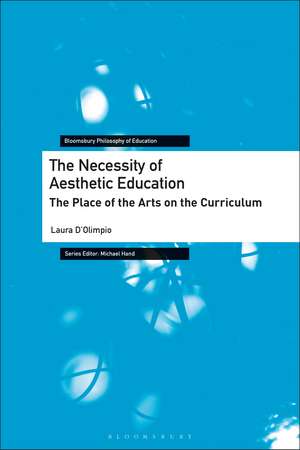The Necessity of Aesthetic Education: The Place of the Arts on the Curriculum: Bloomsbury Philosophy of Education
Autor Laura D’Olimpioen Limba Engleză Hardback – mai 2024
Preț: 538.43 lei
Preț vechi: 626.08 lei
-14% Nou
Puncte Express: 808
Preț estimativ în valută:
103.03€ • 112.26$ • 86.82£
103.03€ • 112.26$ • 86.82£
Carte tipărită la comandă
Livrare economică 23 aprilie-07 mai
Preluare comenzi: 021 569.72.76
Specificații
ISBN-13: 9781350120907
ISBN-10: 1350120901
Pagini: 208
Dimensiuni: 156 x 234 mm
Greutate: 0.44 kg
Editura: Bloomsbury Publishing
Colecția Bloomsbury Academic
Seria Bloomsbury Philosophy of Education
Locul publicării:London, United Kingdom
ISBN-10: 1350120901
Pagini: 208
Dimensiuni: 156 x 234 mm
Greutate: 0.44 kg
Editura: Bloomsbury Publishing
Colecția Bloomsbury Academic
Seria Bloomsbury Philosophy of Education
Locul publicării:London, United Kingdom
Caracteristici
Considers and makes recommendations for required teacher education, curricula and policy needs for arts education situated within a contemporary, technological, global society
Notă biografică
Laura D'Olimpio is Associate Professor of Philosophy of Education at the University of Birmingham, UK, and author of Media and Moral Education: a philosophy of critical engagement (2018). She is co-editor of Educating Character Through the Arts (2023) and co-editor of the Journal of Philosophy in Schools.
Cuprins
Series Editor's ForewordAcknowledgementsIntroduction1. Arts Education in Policy and Practice2. Why Value The Arts and Arts Education?3. Defending Arts Education4. On the Centrality of Aesthetic Experience5. Objections and Replies6. Instrumental Defences of Arts Education7. Aesthetics and EthicsConclusion: The Necessity of Arts EducationReferencesIndex
Recenzii
D'Olimpio offers a deep investigation into the role and value of aesthetic education introducing the reader to multiple defenses for its value in the K-12 curriculum including those made by Elliot Eisner and Maxine Greene. She successfully argues that the intrinsic value of the aesthetic experience is fundamental to the well-being and overall education of students and that including aesthetic education into the curriculum does not require any further extrinsic reasons.
Advocates of arts education tend to speak in platitudes. This book moves firmly beyond the platitudes by providing a rigorous defence of the necessity of aesthetic education in terms of both its intrinsic value and extrinsic benefits. Written with gusto and persuasion, this work serves both as a formidable philosophical treatise and an inspired manifesto. I particularly recommend Chapter 7 on the complex relationship between aesthetics and ethics. A delightful read.
Advocates of arts education tend to speak in platitudes. This book moves firmly beyond the platitudes by providing a rigorous defence of the necessity of aesthetic education in terms of both its intrinsic value and extrinsic benefits. Written with gusto and persuasion, this work serves both as a formidable philosophical treatise and an inspired manifesto. I particularly recommend Chapter 7 on the complex relationship between aesthetics and ethics. A delightful read.






